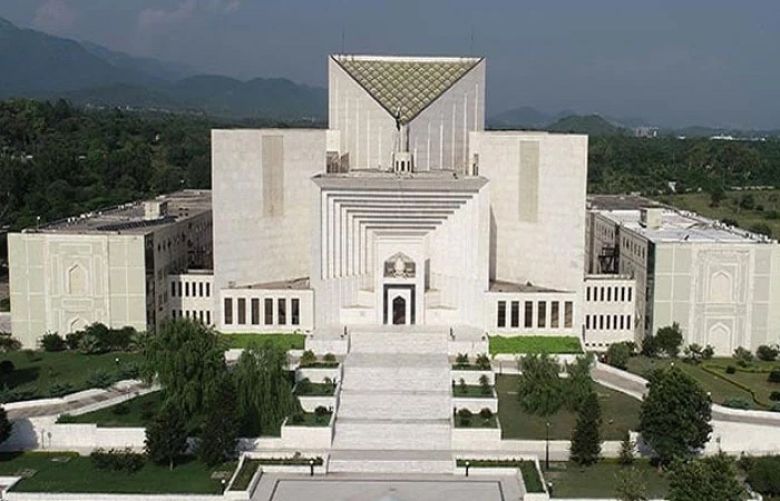The Supreme Court on Friday suspended the operation of the federal government’s notification on the constitution of a judicial panel — formed last week to probe audio leaks which have surfaced on social media over the last few months — and stayed the commission’s proceedings.
“In the circumstances, till the next date of hearing, the operation of the impugned notification No.SRO.596(I)/2023 dated 19.05.2023 issued by the Federal Government is suspended as is the order dated 22.05.2023 made by the Commission and in consequence thereof proceedings of the Commission are stayed,” the top court said.
On May 19, the government formed a judicial commission, headed by Justice Qazi Faez Isa, under Section 3 of the Pakistan Commission of Inquiry Act 2017.
According to it, Balochistan High Court Chief Justice Naeem Akhtar Afghan and Islamabad High Court Chief Justice Aamer Farooq were also included in the commission which had “all the power to fix responsibility against the delinquents for their alleged role behind phone tapping and could exercise authority to constitute special teams consisting of experts, or form an international team and seek international cooperation or exercise powers” under the Criminal Code of Procedure.
Earlier in the day, the Pakistan Electronic Media Regulatory Authority (Pemra) sent transcripts of nine alleged audio leaks to the judicial commission for investigation.
The reserved verdict was issued by a five-member bench comprising Chief Justice of Pakistan (CJP) Umar Ata Bandial, Justice Ijazul Ahsan, Justice Munib Akhtar, Justice Syed Hasan Azhar Rizvi and Justice Shahid Waheed.
The order was passed on a set of petitions moved by Supreme Court Bar Association (SCBA) President Abid Shahid Zuberi, SCBA Secretary Muqtedir Akhtar Shabbir, PTI Chairman Imran Khan and Advocate Riaz Hanif Rahi seeking to declare the constitution of the audio commission illegal.
During the hearing today, CJP Bandial observed that the formation of the government-appointed judicial commission “interfered in the judiciary’s internal matters” and noted that there were errors in the notification issued by the government for the formation of the commission.
“The Constitution gives complete freedom to the judiciary,” he remarked. “The investigation that was supposed to be conducted by the institutions was entrusted to judges.”
Justice Bandial further said, “We have no other structure but the power of morality and justice.”
After two-hour-long proceedings, the court reserved its verdict on the petitions and said that an appropriate order would be issued today.
It said the proceedings will be taken up again on May 31 (Wednesday).
The hearing
Babar Awan appeared on behalf of the PTI chairman while SCBA President Abid Shahid Zuberi and Secretary Muqtedir Akhtar Shabbir were also present alongside Advocate Riaz Hanif Rahi.
At the outset of the proceedings, AGP Awan came to the rostrum and objected to the five-member larger bench hearing the case.
At this, the CJP remarked, “How can the government select judges of the Supreme Court [to serve] its own purpose?”
“Attorney general sahib, this is a matter concerning the judiciary’s independence. Enough is enough attorney general sahib, take a seat,” CJP Bandial said.
He said that the government cannot have judges included in benches “as per its wishes”. He further said that because of the events of May 9, when violent protests broke out in the country following the arrest of the PTI chief, statements that were critical of the judiciary had stopped.
“Don’t interfere with our administrative powers,” Justice Bandial told the AGP. “We have complete respect for the government,” he said, adding that the judiciary was the protector of basic human rights.
Justice Bandial also observed that the government had legislated on regulating the CJP’s powers in haste. “If the government would have consulted us, we would have shown [you] a better path. You have also made bail and family cases a part of the legislation,” he said.
Subsequently, Shoaib Shaheen — the SCBA president’s lawyer — started presenting his arguments, citing previous top court verdicts in similar cases.
“The chief justice’s consultation is necessary before appointing an incumbent service judge to a commission. Consultation is necessary before appointing any private person to a commission as well because the matter concerns a judicial inquiry,” he said.
At that, the attorney general said, “Clarification on the matter can be given.”
CJP Bandial observed, “The federal government should take care of the quarters in the affairs of the judiciary. The government itself suggested judges for the inquiry commission.
“Before this, the government had suggested judges in three notifications, which were later withdrawn,” he recalled.
For his part, AGP Awan told the court that the Act 2017 had not been challenged to which the top judge replied, “The 1956 Act speaks of respecting the Constitution. The justices will come to this point later.”
The attorney general said he was ready to present arguments on the matter right now. However, the CJP interjected and said: “The federal government is requested to respect the Constitution. Take action according to the traditions while respecting the Constitution.”
The top justice further said that the “government tried to create differences between the judges”.
He asked if the question of who was behind phone tapping was not included in the formation of the judicial commission, stressing that phone tapping was an unconstitutional act.
Justice Akhtar also remarked that tapping telephonic conversations was not just an illegal act but also a violation of human rights under Article 14 of the Constitution. “In this case, the question of the freedom of courts also exists.”
Advocate Shaheen agreed. “The question of who tapped the audios is nowhere written in the code of the inquiry commission,” he highlighted.
The lawyer went on to say that the government was giving the impression that the act of phone tapping was acceptable. “The government should clarify that none of its agencies were involved in tapping phones.”
Here, CJP Bandial said the Benazir Bhutto government case was present with regard to phone tapping. “Rules were also set in Justice Qazi Faez Isa’s case,” he pointed out.
“But who will determine which judge violated the code of conduct?” he asked.
Shaheen responded that under Article 209 of the Constitution, “these power lie under the Supreme Judicial Council”. However, the lawyer pointed out that in the current scenario, the authority of the SJC had been given to the inquiry commission.
At one point during the hearing, the CJP said, “Audio leaks were accepted as correct on mere assumptions.”
Meanwhile, Shaheen recalled that the commission had issued a notice to the general public and asked them to provide any information they may have on the matter to the commission secretary.
“There was no implementation of a legal procedure,” he lamented.
“You say the formation of the judicial commission is a violation of Article 209,” CJP Bandial noted, to which Shaheen said that the SC had previously issued orders in cases pertaining to Justice Isa and former chief justice Iftikhar Chaudhry.
At that, Justice Akhtar said Article 209 allowed the executives to send a presidential reference to the SJC. “Prima facie, the federal government has committed misconduct by collecting material against the serving judges of the Supreme Court,” he remarked.
The federal government has violated the distribution of power in the Constitution, the judge added.
Justice Akhtar also asked how serving SC judges could willingly become a member of the commission. “With the permission of the chief justice, an action against a judge of the higher courts can be taken to any forum other than the judicial council.
“Efforts are underway to give cover by using sweet words,” he said, highlighting that “this is a very disturbing situation”.
On the other hand, CJP Bandial said, “The judicial commission has seemingly done everything in haste.”
Justice Akhtar also asked if the government or Pakistan Electronic Media Regulatory Authority (Pemra) had issued directives to prevent the airing of audio leaks.
“Pemra did not conduct any inquiry into it,” Shaheen replied, adding that the government also did not take any action in this regard.
Here, AGP Awan said that he agreed with the court on Pemra’s inaction.
Concluding his arguments, Shaheen said bugging and phone tapping were a violation of the privacy of citizens and the Constitution did not allow the act. He recalled that rules were formed through a majority verdict in the Justice Isa case and the surveillance of judges was prohibited.
“There is no law that authorises agencies to tap citizens’ phones and invade privacy,” he contended. “It is the responsibility of a democratic government to prioritise the protection of the fundamental rights of citizens and their privacy in view of the rule of law,” Shaheen added.







